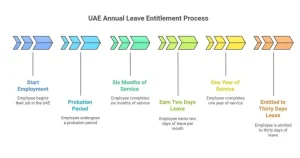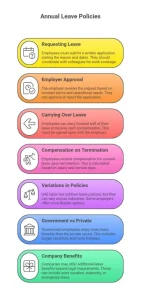The UAE labor laws define employment regulations, salary, benefits, and paid leave for the workforce. Sick leave and annual leave in UAE for the workforce depend on certain conditions. Employees on probation may not have paid leave, and permanent employees get paid sick and annual leave in UAE.
It’s essential to understand the UAE regulatory framework regarding sick leave, emergency leave, annual leave, and public holidays. Transparent communication with the employer is the key to accessing all employment benefits and enjoying your well-deserved time off. You will explore in this article what annual leave is in the UAE and how many days of annual leave in the UAE are available for employees.
Earning Annual Leave in the UAE
How to calculate annual leave in UAE? Annual leave is based on the employee’s service duration. Employees who have completed a full year are entitled to thirty days of paid leave. Employees who have worked for less than a year may earn two paid days off monthly after six months of service.
Probation Period and Leave Eligibility
The labor law, annual leave in UAE 2024, regulates a maximum six-month probation period for employees who are not eligible for paid annual leave during this period. However, employers may provide leave at their discretion. Once the probation period ends, employees can acquire paid annual or sick leave. They earn two days per month after six months of service until they complete a year and become eligible for thirty days of paid annual leave.
Minimum Annual Leave Entitlement
UAE labor law guarantees thirty days of paid annual leave for employees completing a full year of service. Employees with less than a year but at least six months can get two paid leaves per month. These are the base entitlements, and some employers may offer better packages or additional benefits for their workforce.

Taking Your Annual Leave
Employees must submit a written leave application to the employer and request annual paid leave in advance. However, the employer has the right to approve or reject the application according to the terms and conditions of the employment contract and organizational requirements. Clear communication is essential for employees and employers for smooth work relationships. Employees must provide the required evidence and proof of absence, and effective communication can cover their absence securely.
Requesting and Scheduling Leave
Employees must submit a written leave application to their employer to request annual leave. They must clearly state the reason and the date for the leave. They need to coordinate with colleagues to ensure easy work coverage in their absence. The employer has the right to review and approve or reject the leave request based on employment contract terms, legitimate reasons, and business operational needs.
Carrying Over Unused Leave
Employees can carry forward up to half of their annual leave to the following year or receive a cash allowance for the unused paid leave, agreed with the employer.
Compensation for Unused Leave Upon Termination;
At the end of service in the UAE, employees have the right to receive compensation for any unused annual leave. It is calculated based on their basic salary and the days of service. They must ensure that to receive this payment along with their final settlement.
Variations in Annual Leave Policies
UAE labor law outlines sick and annual leave for employees with specific policies that can vary across different industries. Some employers may offer more flexible paid leave packages, including additional vacation leave, paid emergency leave, or other flexible leave options. It’s wise to review your employment contract carefully to understand your specific leave entitlements and any conditions required for the paid annual leave.
Government vs. Private Sector Leave Allowances
Government employees in the UAE enjoyed more leave benefits than the private sector, including longer, paid vacation, annual leave, more public holidays, and enhanced sick leave entitlements.
Company-Specific Leave Benefits
UAE labor law provides a specific framework for annual leave. However, various companies offer additional benefits beyond these requirements. It can include extra paid leave for vacations, paid maternity leave, emergency leave, study leave, and sick leave. Company policies define the eligibility criteria, duration, and required conditions for these extra leave entitlements. It’s essential to review the employment contract for detailed information regarding leave and compensation.
Annual Leave during Public Holidays
Public holidays in the UAE are typically paid. If a public holiday falls on a weekday during your annual leave, it will not extend your leave. However, some companies offer additional paid leave or compensatory time off to balance public holidays and paid annual leave. It’s essential to check the company’s policy for public holidays and annual leave to understand how they interact and enjoy the full benefits.
Do Public Holidays Count as Annual Leave?
Public holidays in the UAE are not counted as annual leave for employees. It will not reduce or extend the annual leave period. However, it does count as a day taken from your leave for balance.
Taking Leave Around Public Holidays
Several employees plan their annual leave to enjoy public holidays simultaneously for extended breaks. However, some companies may have flexible policies regarding leave taken around public holidays. It’s essential to check the company’s policies to avoid any misunderstanding and inconvenience. Public holidays are paid, and they can affect your leave balance or require advance notice for leave requests.

Important UAE Labor Laws Regarding Annual Leave
UAE labor law guarantees a minimum of one month of paid annual leave after one year of service. Employees with six months of service earn two days per month. Employers must grant leave for valid reasons and pay for unused leave days upon the end of service as compensation.
Employee Rights and Employer Obligations
UAE labor law ensures a balanced relationship between employers and employees for smooth operations and a healthy work environment. Employees have the right to obtain fair and timely salaries, a safe and healthy working environment, sick or annual paid leave, overtime compensation, and security from gender or race discrimination. Employers must provide transparent employment contracts, comply with UAE labor regulations, provide fair and timely salary distribution, and provide basic health insurance.
Resources for Obtaining Further Information
Employees must know their rights according to the UAE regulations on paid annual leave entitlements. They can further check on MOHRE’s online web portal for specific details, guidelines, and common queries. If any employee has disputes or complex queries, they can access a legal advisor or professional service to seek help and comply with the regulations in the UAE.
FAQs for Annual Leave in UAE
How many days of annual leave is an employee entitled to in the UAE?
Employees get 30 days of paid annual leave after one year of service. After six months, they earn two paid leave days per month until completing a year.
How is annual leave calculated for part-year service?
If you’ve worked six months but less than a year, you earn two days of paid leave per month—calculated from your basic salary, excluding allowances.
Are unused leave days paid out upon contract termination?
Yes! Any unused annual leave must be paid as part of your final settlement. It’s calculated based on your basic salary and remaining leave balance.
Can employers require employees to carry over annual leave to the next year?
Workers can carry over up to half their unused annual leave. They can also take cash compensation. However, the decision depends on company policy and mutual agreement.
What’s the notice period to apply for annual leave?
Workers must apply in writing. They are required to request leave in advance. The notice period depends on the company’s internal policy. It is also dependent on job contract terms.



